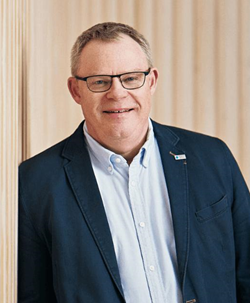![]() Plenary speakers
Plenary speakers

Bjørn Kløve is a professor of Water Resources Engineering at the University of Oulu, Finland, where he leads the 110-member Water, Energy and Environmental Engineering research unit. He also holds a part-time position at NIBIO in Norway. His research focuses on understanding surface and groundwater systems through the integration of hydrological process studies, remote sensing, and numerical modeling. By working across disciplines—including climatology, sociology, geochemistry, ecology, and ICT—Kløve aims to develop sustainable strategies to mitigate the environmental impacts of land use and climate change.
With over 240 scientific publications and an h-index of 58, Kløve has supervised 25 PhD theses and led more than 50 major research projects, including several EU Framework Programme projects, Academy of Finland initiatives, and Nordic collaborations. He played a central role in Finland’s national doctoral school for water research and currently leads the Digital Waters Flagship project, involving over 150 researchers and a PhD pilot program spanning five universities. His academic background includes a PhD from Lund University, along with earlier degrees from Helsinki University of Technology, all specializing in water resources and environmental engineering.
PEATLAND HYDROLOGY AND WETLAND WATER MANAGEMENT
Bjørn Kløve
Water, energy and environmental engineering research unit,
University of Oulu, Finland
Abstract
Peatlands are ecologically significant wetland ecosystems found in both boreal and tropical regions with an excess of rainfall. They host unique biodiversity and perform multiple ecosystem functions. As major carbon sinks, peatlands store vast amounts of carbon that can be released when drained for agriculture or forestry, making their management vital both locally and globally. However, drainage can lead to erosion, degraded water quality, and increased flooding, posing serious environmental and land-use challenges. Sustainable peatland management emphasizes protection and restoration, particularly through water table regulation—a priority that has gained importance in recent decades. In their natural state, high water tables and waterlogged conditions slow decomposition and promote peat accumulation. When drained, the water table drops, leading to subsidence and various environmental impacts that complicate further land use. Mitigation strategies for drained peatlands include water table control, managed runoff, controlled drainage, and the use of nature-based solutions to treat discharge.

